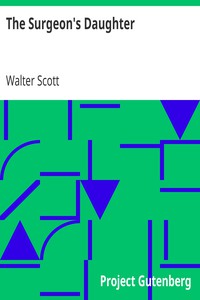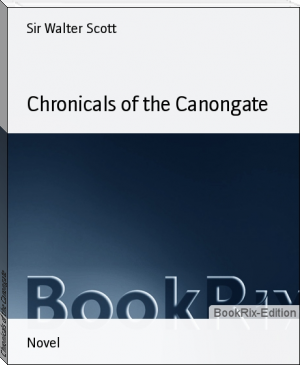The Surgeon's Daughter by Walter Scott (summer beach reads .txt) 📗

- Author: Walter Scott
Book online «The Surgeon's Daughter by Walter Scott (summer beach reads .txt) 📗». Author Walter Scott
The Moullah was seated on the earth, from which he did not arise, or show any mark of reverence; nor did he interrupt the tale of his beads, which he continued to count assiduously while Hartley was speaking. When he finished, the old man raised his eyes, and looked at him with an air of distraction, as if he was endeavouring to recollect what he had been saying; he at length pointed to one of the cells, and resumed his devotions like one who felt impatient of whatever withdrew his attention from his sacred duties, were it but for an instant.
Hartley entered the cell indicated, with the usual salutation of Salam Alaikum. His patient lay on a little carpet in a corner of the small white-washed cell. He was a man of about forty, dressed in the black robe of his order, very much torn and patched. He wore a high conical cap of Tartarian felt, and had round his neck the string of black beads belonging to his order. His eyes and posture indicated suffering, which he was enduring with stoical patience.
“Salam Alaikum,” said Hartley; “you are in pain, my father?”—a title which he gave rather to the profession than to the years of the person he addressed.
“Salam Alaikum bema sebastem,” answered the Fakir; “Well is it for you that you have suffered patiently. The book saith, such shall be the greeting of the angels to those who enter paradise.”
The conversation being thus opened, the physician proceeded to enquire into the complaints of the patient, and to prescribe what he thought advisable. Having done this, he was about to retire, when, to his great surprise, the Fakir tendered him a ring of some value.
“The wise,” said Hartley, declining the present, and at the same time paying a suitable compliment to the Fakir's cap and robe,—“the wise of every country are brethren. My left hand takes no guerdon of my right.”
“A Feringi can then refuse gold?” said the Fakir. “I thought they took it from every hand, whether pure as that of an Houri, or leprous like Gehazi's—even as the hungry dog recketh not whether the flesh he eateth be of the camel of the prophet Saleth, or of the ass of Degial—on whose head be curses!”
“The book says,” replied Hartley, “that it is Allah who closes and who enlarges the heart. Frank and Mussulman are all alike moulded by his pleasure.”
“My brother hath spoken wisely,” answered the patient. “Welcome the disease, if it bring thee acquainted with a wise physician. For what saith the poet—'It is well to have fallen to the earth, if while grovelling there thou shalt discover a diamond.'”
The physician made repeated visits to his patient, and continued to do so even after the health of El Hadgi was entirely restored. He had no difficulty in discerning in him one of those secret agents frequently employed by Asiatic Sovereigns. His intelligence, his learning, above all, his versatility and freedom from prejudices of every kind, left no doubt of Barak's possessing the necessary qualifications for conducting such delicate negotiations; while his gravity of habit and profession could not prevent his features from expressing occasionally a perception of humour, not usually seen in devotees of his class.
Barak el Hadgi talked often, amidst their private conversations, of the power and dignity of the Nawaub of Mysore; and Hartley had little doubt that he came from the Court of Hyder Ali, on some secret mission, perhaps for achieving a more solid peace betwixt that able and sagacious Prince and the East India Company's Government,—that which existed for the time being regarded on both parts as little more than a hollow and insincere truce. He told many stories to the advantage of this Prince, who certainly was one of the wisest that Hindostan could boast; and amidst great crimes, perpetrated to gratify his ambition, displayed many instances of princely generosity, and, what was a little more surprising, of even-handed justice.
On one occasion, shortly before Barak el Hadgi left Madras, he visited the Doctor, and partook of his sherbet, which he preferred to his own, perhaps because a few glasses of rum or brandy were usually added to enrich the compound. It might be owing to repeated applications to the jar which contained this generous fluid, that the Pilgrim became more than usually frank in his communications, and not contented with praising his Nawaub with the most hyperbolic eloquence, he began to insinuate the influence which he himself enjoyed with the Invincible, the Lord and Shield of the Faith of the Prophet.
“Brother of my soul,” he said, “do but think if thou needest aught that the all-powerful Hyder Ali Khan Bohander can give; and then use not the intercession of those who dwell in palaces, and wear jewels in their turbans, but seek the cell of thy brother at the Great City, which is Seringapatam. And the poor Fakir, in his torn cloak, shall better advance thy suit with the Nawaub [for Hyder did not assume the title of Sultann] than they who sit upon seats of honour in the Divan.”
With these and sundry other expressions of regard, he exhorted Hartley to come into the Mysore, and look upon the face of the Great Prince, whose glance inspired wisdom, and whose nod conferred wealth, so that Folly or Poverty could not appear before him. He offered at the same time to requite the kindness which Hartley had evinced to him, by showing him whatever was worthy the attention of a sage in the land of Mysore.
Hartley was not reluctant to promise to undertake the proposed journey, if the continuance of good understanding betwixt their governments should render it practicable, and in reality looked forward to the possibility of such an event with a good deal of interest. The friends parted with mutual good wishes, after exchanging in the Oriental fashion, such gifts as became sages, to whom knowledge was to be supposed dearer than wealth. Barak el Hadgi presented Hartley with a small quantity of the balsam of Mecca, very hard to be procured in an unadulterated form, and gave him at the same time a passport in a peculiar character, which he assured him would be respected by every officer of the Nawaub, should his friend be disposed to accomplish his visit to the Mysore. “The head of him who should disrespect this safe-conduct,” he said, “shall not be more safe than that of the barley-stalk which the reaper has grasped in his hand.”
Hartley requited these civilities by the present of a few medicines little used in the East, but such as he thought might, with suitable directions, be safely intrusted to a man so intelligent as his Moslem friend.
It was several months after Barak had returned to the interior of India, that Hartley was astonished by an unexpected rencounter.
The ships from Europe had but lately arrived, and had brought over their usual cargo of boys longing to be commanders, and young women without any purpose of being married, but whom a pious duty to some brother, some uncle, or other male relative, brought to India to keep his house, until they should find themselves unexpectedly in one of their own. Dr. Hartley happened to attend a public breakfast given on this occasion by a gentleman high in the service. The roof of his friend had been recently enriched by a consignment of three nieces, whom the old gentleman, justly attached to his quiet hookah, and, it was said, to a





Comments (0)